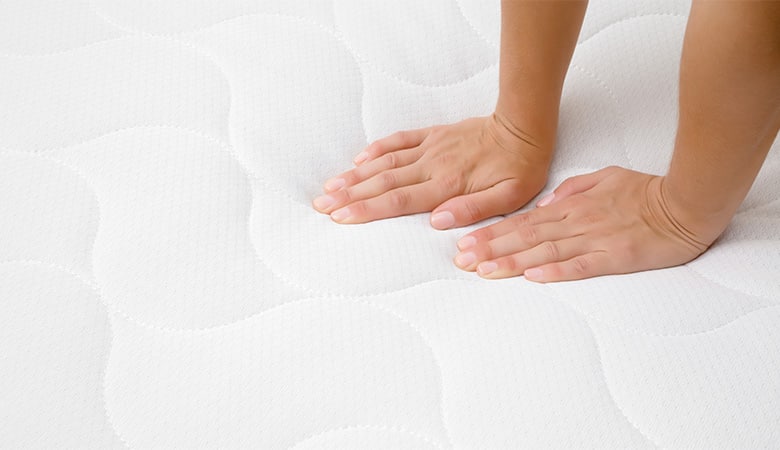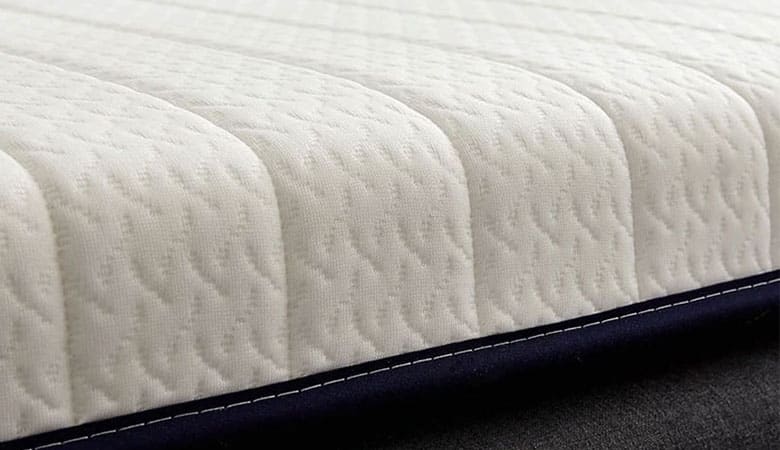I get it. When you are a little on the heavy side of the spectrum, you may worry that a memory foam mattress won’t support your weight adequately.
It’s common to find other mattress types in any bedroom, especially airbeds and spring mattresses. But if we are honest, the benefits of memory foam seem more attractive and warrant the switch.
However, when you are plus size, you want to be sure the mattress is for you, which warrants the question, are memory foam mattresses good for heavy people? Yes, memory foam mattresses are good for heavy people because of their contouring and pressure relief. However, you should choose a memory foam mattress that feels a bit firm and one that can support your body, conforming without sagging too much.
In this post I go more in depth into picking the correct mattress for a person who are on the heavier side, as well as looking into where memory foam fits in the equation. Read on to learn more.
How Does Your Weight Affect Your Mattress Choice?
Weight has a significant role to play when choosing a mattress because the more you weigh, the higher the pressure you exert. The higher the pressure, the better support you need, which means your mattress must have a strong structural support. Without this, you will be uncomfortable, your sleep will be disrupted, and you are likely to wake up feeling tired, and with body aches.
Unfortunately, the market is flooded with mattresses that accommodate people who weigh 230 pounds or less. Anyone who weighs 200 pounds or less will have more options when choosing a mattress, but that doesn’t mean you are left out. Although the options may be limited, some brands consider heavier people.
So, what should you look out for when purchasing a memory mattress, just to ensure you get the right fit?
1. Responsiveness
Responsiveness is basically how bouncy a mattress is, and is one of the most crucial factors to consider. When a mattress is non-responsive, such as mattresses made of memory foam, you may end up feeling stuck in the mattress. As mentioned earlier, the heavier you are, the more pressure you exert on a mattress, so the deeper you sink into it.
Now, memory foam mattresses are known to mold the body, following your weight and body heat. The mattress distributes your body weight and returns to normal when you change positions. These properties make the mattress very comfortable, but it could also be what makes them uncomfortable for heavier sleepers.
If you sink deep into the mattress, you are likely to be uncomfortable and feel “stuck,” which doesn’t help your sleep. If this is the case, you are better off with a responsive mattress, especially those made with latex, hybrid, and innerspring construction. They allow for ease of movement and keep you comfortable through the night and during intimacy.
2. Contouring

Every mattress should allow for just the right amount of contouring to remain close enough to your body and reduce pressure around your shoulders, spine, and hips, all without sagging excessively.
If your bed and mattress comfort too closely, it means they don’t have enough support for your body weight. You will sink deeper into the mattress, which will be uncomfortable. This is especially true if you are over 230 pounds.
Since most mattresses aren’t built with heavier people in mind, they tend to have that sinking feeling and are often sagging. Heavier sleepers carry most weight around the hips and core area, making it crucial to have enough surface support around the core.
3. Your sleeping position
Most people don’t consider their sleeping position when choosing a mattress, but that’s a mistake, especially if you weigh more than 200 pounds. Your sleeping position has a tremendous impact on your mattress because of how you will distribute your weight.
If you are a side sleeper, a medium-firm mattress will work best for you as it will relieve pressure off your shoulders and hips while offering enough support to your spine and joints.
Back sleepers do better with a firm mattress because their spines need more support. The firmness also prevents their shoulders and hips from sinking in, keeping them comfortable all night long.
Stomach sleepers also do well with a firm mattress because, like back sleepers, they need to keep their hips and shoulders leveled to prevent the lower back’s curvature. This elevates pressure from the spine and neck and keeps them relaxed and comfortable.
What Type of Mattress is Best For Heavier Sleepers?
There isn’t a black and white answer to this question because your preferences play a huge role in determining what will work for you. To make it easier, though, we will look at each mattress type and why it could be your ideal option.
1. Memory foam mattress

These mattresses are best because of their contouring and pressure relief. If you prefer conforming or experience joint aches due to pressure, then this is still your best bet. However, you should choose a memory foam mattress that feels a bit firm and one that can support your body, conforming without sagging too much.
Most heavy sleepers say they tend to ‘sleep hot.’ Memory foam tends to sleep warmer than other mattress types, so keep this in mind when making your purchase. Because of tech, some memory foam mattresses have a way of keeping you cool throughout the night, so stay away from basic memory foam if you decide to go with this option.
2. Airbeds
These are often a favorite to heavier sleepers, and with good reasons. You can customize your comfort, determining if you need it extremely firm, soft, or somewhere in between.
Most Airbeds have tons of levels in between to choose from, so you are likely to get a good fit. If your comfort fluctuates every other night, this is definitely your best option since you can choose what you prefer. You will, however, pay for this flexibility as most airbeds are pricey.
3. Innerspring
Think of innersprings mattresses as a reliable friend. They are mostly stable and come with a polyfoam comfort layer to keep you comfortable.
The springs around the core are usually thicker, keeping you even and ensuring you don’t sink too much or have added pressure. Innerspring mattresses also promote breathing, so you remain cool as you sleep.
What’s The Best Mattress Thickness For Heavier People?

Your mattress thickness often determines your comfort and support. Generally, mattress thickness ranges between six and fourteen inches thick. Most memory foam and latex mattresses tend to be on the lower side of the scale, while innerspring and hybrid are higher.
Because of the amount of pressure heavier people exert on a mattress, it makes sense to use thicker mattresses as they offer deeper compression support.
People less than 200 pounds will do well on ten-inch thickness, and you may be lucky to find a mattress with advanced foams and thicker layers if you are heavier than this. But, when faced with a choice between a thicker mattress and one with a thicker top layer, go for the thicker mattress. In fact, as a rule of thumb, always go for thicker mattresses, as they offer more comfort and support.
Finally, remember to check out the edge support, especially if you are fond of sitting on your mattress. Mattresses with firm edge support prevent sagging and collapse, which comes in handy for people who prefer to sleep along the edge. If you have a partner, both of you can sleep next to the edge while maintaining comfort.
